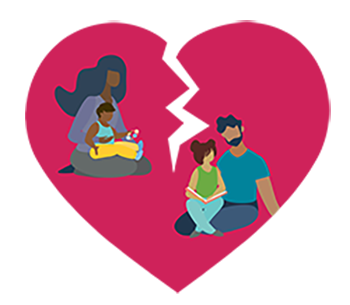Issues
Family law deals with the rights and responsibilities within families. A big part of family law is dealing with families after a break up. There are a lot of things to work through when couples split up, including:
- who gets what property,
- how parents will take care of their children
- how the children will be financially supported, and
- if one spouse gets financial support from the other.
Laws regarding adopting and protecting children also fall under family law.
Laws that apply
The Divorce Act is a federal law that may only be used in Supreme Court by married couples. This act deals with divorce as well as parenting and support issues.
The Family Law Act is a provincial law that can be used by married couples or “common law” couples. A couple is common law when they live together for at least two years in a marriage like relationship but are not actually married. Common law and married couples had the same rights and responsibilities under the Family Law Act. This act can be used in both Provincial Court and Supreme Court. It deals with property, parenting and support issues. It also deals with protection orders.
|
Deals with |
The Family Law Act |
The Divorce Act |
|
Divorce |
|
✔ |
|
Property |
✔ |
✗ |
|
Parenting and support |
✔ |
✔ |
|
Common law couples |
✔ |
|
|
Married couples |
✔ |
✔ |
Adoption and child protection are dealt with by separate acts.
Where to file
You can start your lawsuit in the Supreme Court or Provincial Court depending on the type of claim. See the chart below to see where to start different claims. Generally the Provincial Court is cheaper and easier to deal with, particularly if you do not have a lawyer. The rules of the Provincial Court are less complicated, the cases are usually heard more quickly, and the court costs are lower than the Supreme Court. However, the formality of the Supreme Court can be beneficial, particularly if you are dealing with very complicated issues or a difficult opposing party. You can choose to bring some issues to the Provincial Court and others to the Supreme Court.
|
Claims |
Provincial Court |
Supreme Court |
|
Divorce |
✗ |
✔ |
|
Custody/ guardianship |
✔ |
✔ |
|
Access/ Parenting Arrangements |
✔ |
✔ |
|
Child support and spousal support |
✔ |
✔ |
|
Property/Debt division |
✗ |
✔ |
Financial Disclosure
Family law has special rules for financial disclosure in cases where financial support or property are involved. Complete financial disclosure is required so that the parties can negotiate a settlement without the fear that the other person is hiding something from them. This is to ensure fairness and to make sure children are properly supported.
Who decides
Family law trials are decided only by judges. There are no juries.
Alternatives to Court
Going to court can sometimes make conflict worse for separating couples. To avoid increasing conflict, the courts encourage couples to sort out as much as possible on their own. This is not always possible, particularly where there has been family violence. Nevertheless, most people are eventually able to come to an agreement and very few family cases go to trial. There are many resources to help couples arrive at an agreement, such as
- collaborative family lawyers who will work together in coming to agreement,
- Family Justice Counselors, and
- mediation services.






